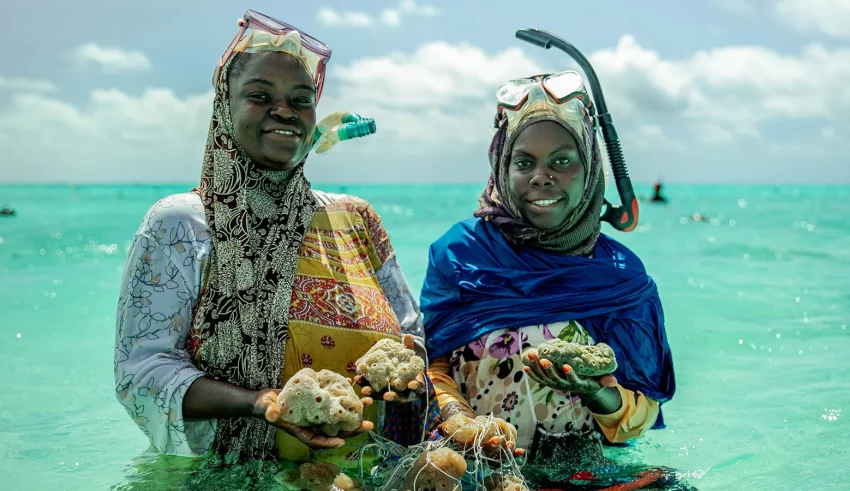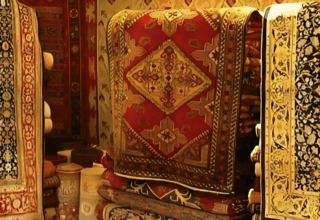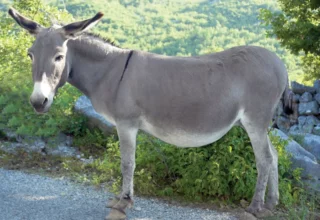As a gentle morning breeze blows across the Zanzibar shore, Hindu Simai Rajabu walks through knee-deep water to reach a shallow lagoon off the coast of Jambiani, Tanzania, where her floating sponge farm is located.
Sporting shiny goggles and with a snorkel placed on top of her headscarf, Rajabu wades through the Indian Ocean, her laughter at the experience of being filmed mingling with the sound of the crashing waves.
As the tide rises, the 31-year-old mother of two swims and submerges to the depth of the buoys which hold the floating sponge farm in place.
The quest for prosperity has led Rajabu and 12 other divorced women and single mothers from Zanzibar’s Jambiani village into the Indian Ocean to grow climate-resilient sponges.
Farming sea sponges has become a lucrative business for these women in recent years. Many women in Jambiani farm seaweed, but low yields due to rising sea temperatures have started to make it to earn a living. In 2009,some women began switching to growing puff-like soft sea sponges: primitive aquatic animals that, when harvested, are used for bathing and cleaning.
Sea sponges are more resilient to warmer temperatures and filter pollutants such as sewage and pesticides out ofthe water.
Local women’s rights activists say sea sponge farming is helping to improve gender equality in Zanzibar and has lifted these women out of poverty. The farmers themselves say.
“The sponges are delicate animals; if I don’t clean them well they will die,” says Rajabu, as she handles them carefully, taking care not to squeeze them.
To prevent the sponges from becoming overheated by the sun or damaged by motorboats, Rajabu ensures they always remain underwater.
She spends four hours every day in the ocean, tending to the farm. In the afternoon, she goes to the office to sort and label dried sponges for sale.
Rajabu dropped out of school when she was 17 because her mother could no longer afford to pay for her studies, crushing her dream of becoming a doctor. When her husband left her after nine years, Rajabu refused to be defined by her circumstances. She started seaweed farming to support her two children.
But she barely earned enough to support them – a mere 70,000 Tanzanian shillings (£22/$28) each month.
In 2020, Rajabu approached Marine Cultures to explain her difficult situation and seek a job. She was swiftly taken on board and started earning a higher income.
“It is a tough job, but I enjoy doing it and it pays quite well,” she says. She now earns a monthly salary of 250,000 Tanzanian shillings (£80/$100).
“I earn a stable monthly income, enough to meet my family’s needs,” she says.
Sea sponges, which are technically animals but grow, reproduce and survive like plants, are comprised of a shell-like layer, riddled with tiny pores which allows water to flow in and out. The marine creatures are thought to have existed for over 600 million years and may well have been Earth’s first animal. Scientists have identified over 15,000 species globally.
Marine Cultures, a Swiss non-profit, established sponge farming in Zanzibar in 2009 to enable poor women to earn a better income and help protect the region’s natural resources.
“I thought it is a good thing to cultivate the sea, not only to take things out, without giving something back,” says founder Christian Vaterlaus.
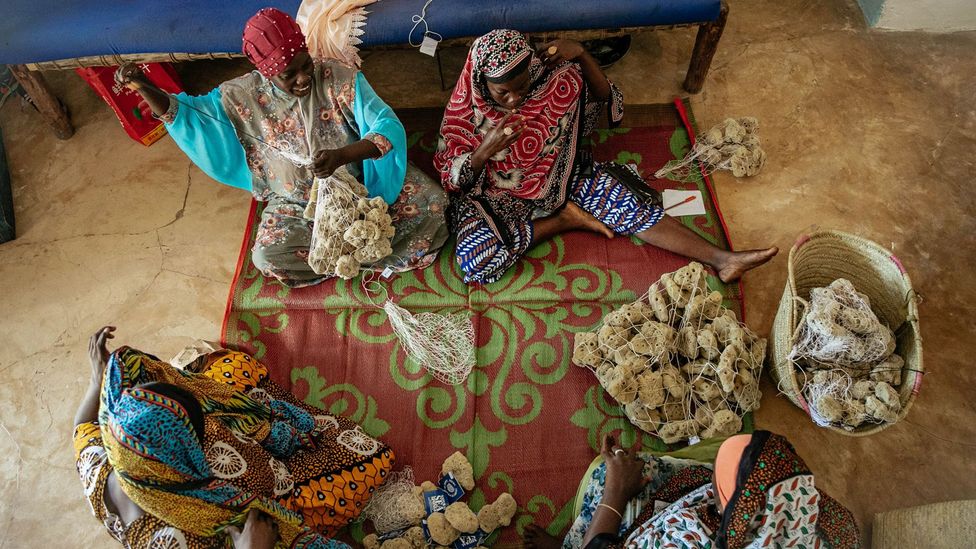
Sea sponge farming has helped women in Jambiani break free from their financial dependence on men (Credit: Lauraclara Cosmas)
Until the early 2000s, the seaweed industry was a backbone of Zanzibar’s local economy, employing 20,000 women farmers, lifting their standard of living and social status. But the seaweed industry has been battered by rising temperatures, says Vaterlaus, threatening the livelihoods of thousands of farmers in Zanzibar.
A 2021 study by researchers at the University of York in the UK found seaweed yields and quality had dropped drastically in the area due to rising temperatures, stronger winds and erratic rainfall.
Despite early gains, the production of seaweed fell by 47% between 2002 and 2012 due to climate change, disease and the decrease of the number of farmers due to low prices, the researchers concluded.
“I found the prices of seaweed are low and the people don’t earn good money,” says Vaterlaus.
In his bid to help cash-strapped seaweed farmers in Jambiani, Vaterlaus introduced the idea and method of growing sponges to the area.
Seaweed is highly vulnerable to climate change, but sponges can tolerate warmer temperatures, allowing them to thrive in hot conditions, Vaterlaus adds.
“During the hot season, it is hard to produce seaweed but sponge farming is still possible,” he says.
Aziza Said, a marine biologist at the University of Dodoma in Tanzania, agrees that sponges are more resilient to hotter temperatures, adding that they also require less maintenance and fetch a higher market price than seaweed.
By providing an alternative to fishing, sponges also reduce pressure on natural resources and protect the environment, Said says. And they enrich the sea bed by spitting out fatty and amino acids for other organisms to absorb, she adds.
Research has also shown that the spongy creatures play an important role themselves in combatting climate change. Sea sponges exist in all oceans around the world and make up 20% of the global silicon biological sink. Their skeletons break down into microscopic pieces of silicon, which helps control the carbon cycle in the ocean and reduces the greenhouse effect, experts say. Dissolved silicon is critical for the growth of diatoms, tiny organisms which absorb large amounts of CO2 in the ocean using photosynthesis.
According to Said, diatoms grow well when there’s a large enough supply of dissolved silicon in seawater.
“When diatoms die, their shells sink to the ocean floor, effectively absorbing carbon in the form of organic matter and silica,” she says.
Sea sponges also effectively filter sea water and reduce marine pollution, according to another study. A single sponge can pump thousands of litres of water per day through a maze of channels and pores that trap impurities and organic substances, the researchers note.
According to another study, up to 24,000 litres (5,300 gallons) of sea water can be pumped through a 1kg (2.2lb) sponge in a single day.
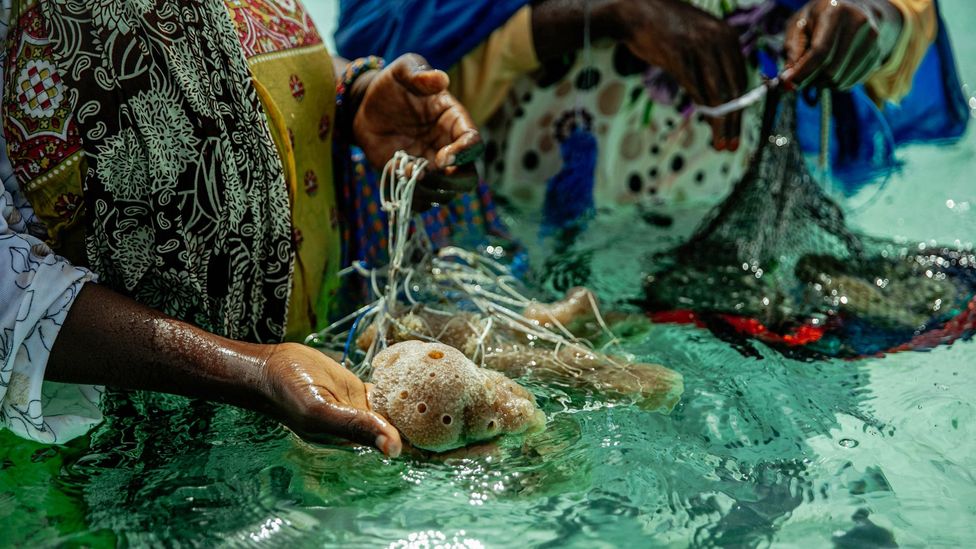
Women in Jambiani switched from farming seaweed to sea sponges as they are more resilient to warmer ocean temperatures (Credit: Lauraclara Cosmas)
The women in Jambiani are trained by Marine Cultures before they start harvesting sea sponges.
Since 2009, 13 women have been trained, according to Ali Mahmudi Ali, who manages the farm.
“We train farmers for one year to ensure they have [the] necessary skills and knowledge to cope with the changing sea conditions,” he says.
The training involves teaching the women to swim, dive, use the equipment and gear, how to clean and care for the sponges, book-keeping, marketing and grading the sponges for sale, he says.
Each sponge is sold for 37,000-74,900 Tanzanian shillings (£12-£24/$15-$30), depending on its size and quality. They are sold to souvenir shops, tourists and hotels in Zanzibar and abroad.
The farmer receives 70%, while 29% goes to the shop and 1% to Zanzibar’s Sponge Farmers’ Cooperative, a women-led organisation which oversees the recruitment of the farmers and production activities.
Sponge farming is helping to redefine traditional gender roles in the Jambiani community of more than 1,400 women who are traditionally confined to childcare and domestic chores, and has ushered in a financially stable future for the women involved, says Nasir Hassan Haji, a female sponge farmer and chair of the farmers’ cooperative.
“[It] has improved farmers’ incomes significantly. We are very proud of this initiative,” says Haji, a 48-year-old mother of four.
She says that sponge farming has helped the women to break free from financial dependence on men, which made them vulnerable to exploitation and abuse. “As women, we should take charge of our own lives. We should not just wait for our husband to bring food on the table,” Haji says.
Now that they are earning a steady income, their influence in family decision-making has increased, she adds.


